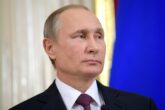October 12, 2018
Angela Merkel Could Save Europe. Why Won’t She?
Campaigning in the spring of 2017, Chancellor Angela Merkel of Germany declared at a packed beer hall in Bavaria that it was time for Europe to “take its destiny into its own hands.” In the face of Britain’s vote to leave the European Union, Hungary’s slide into illiberalism and an American president who viewed the European Union with disdain, Europe, she argued, needed a leader who could push forward reform and push back against its detractors. Ms. Merkel vowed that she was ready to be that leader.
Unfortunately, in the 18 months since, Ms. Merkel has failed to fulfill that pledge. The European Union’s promise to form an “ever closer union” seems more like an empty slogan than a strategy these days. But further integration is necessary. With Europe besieged by illiberal forces inside (Hungary) and from outside (Vladimir Putin’s Russia), and voters electing anti-European Union populists, leaders across the Continent need to demonstrate that they are confident about Europe’s shared future. Ms. Merkel clearly understands this — but she isn’t helping Europe to do anything about it.
Ms. Merkel’s troubles started with the September 2017 election, when her party, the center-right Christian Democrats, and the center-left Social Democrats lost a stunningly large number of voters to the far-right Alternative for Germany. The message was clear: Enthusiasm for Ms. Merkel was waning. It then took the parties more than four months to form a government. Once a coalition was finally established in March, the hope among many pro-European policymakers was that Ms. Merkel would find her footing and return to the European agenda that she had highlighted during the campaign.
Members of her own team have made that difficult. Her interior minister, Horst Seehofer, the head of the Christian Social Union, nearly brought down the entire government last summer when he threatened to resign over Ms. Merkel’s relatively open immigration policies. That crisis was averted, but Mr. Seehofer continues to contradict and challenge the chancellor. And he isn’t the only one. Last month, Ms. Merkel’s own party ousted Volker Kauder, one of her closest allies in the Bundestag, the lower house of Parliament. “The Merkel era is officially over,” a journalist friend of mine texted me when the news broke.
Read the full article at The New York Times.
More from CNAS
-
The Hidden Past and Uncertain Future of the U.S. and Ukraine with Celeste Wallander
Under the Trump administration, U.S. support for Ukraine is no longer guaranteed. President Trump's pause on aid and intelligence to Ukraine in March may have been brief, but ...
By Andrea Kendall-Taylor, Jim Townsend & Celeste Wallander
-
Is Russia Under Pressure?
Since 2014, the United States and its allies have provided increasing military support to Ukraine while imposing more and tougher economic sanctions on Russia, especially sinc...
By Jeffrey Edmonds
-
Europe's Trade War Woes
On April 2nd, President Trump imposed sweeping tariffs across the globe – with only a handful of countries left untouched. The EU was hit with tariffs of 20% and the European ...
By Andrea Kendall-Taylor & Jim Townsend
-
Will Donald Trump Take Greenland by Force?
Trump’s comments have raised alarms in Greenland, particularly after US Vice President JD Vance announced he would visit the island. Greenland is rich in minerals, and it’s st...
By Jim Townsend



